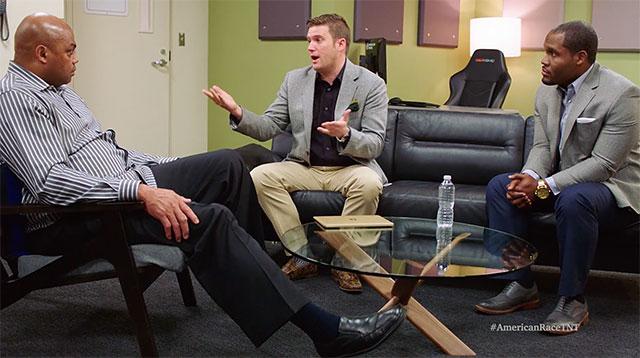If you're hoping to call Charles Barkley a knucklehead for four hours, then American Race is not the show for you.
Barkley, the former NBA star turned basketball commentator turned occasional cultural analyst, doesn't find a cure for racism on his new TNT documentary series. But he uses his celebrity status to start the type of conversations that are needed.
The first of the four episodes premieres 9 p.m. ET on May 11. TNT will air a series preview Sunday after the edition of "Inside The NBA" that follows the Spurs-Rockets playoff game. (If you can't wait for the premiere, all episodes will be available through VOD and the TNT app starting May 8.)
Instead of pushing his opinions or throwing himself into the spotlight in American Race, Barkley takes the role of curious journalist, asking questions and connecting with people in Baltimore, Dallas, Los Angeles and Atlanta. In one sure-to-go-viral scene at a Baptist church in Baltimore, Barkley finds his fame doesn't protect him from being challenged.
After mentioning that he spent some time earlier that day with the Baltimore Police Department, Barkley opens up the floor to questions. The first comes from Diane Butler, the mother of Tyrone West.
"I don't know you, I don't like you," Butler says.
Barkley previously said police have a split second to make a decision in certain cases. Butler explains it took the police 15-20 minutes to beat her child to death.
"It was surreal because I had never met a person whose family member had been murdered by the cops," Barkley said Thursday in New York during a promotional event.
Charles Barkley on @AmericanRaceTNT: "I never try to judge other people. I never tell anybody else they're wrong. We can agree to disagree." pic.twitter.com/LuK6doewnY
— Jeff Eisenband (@JeffEisenband) May 5, 2017
Tyrone West is one of a handful of familiar names that pop up in the series. In Dallas, Khizr and Ghazala Khan, the Gold Star parents of Captain Humanyun Khan, make an appearance. In Los Angeles, Barkley meets with Ice Cube and Norman Lear, the creator of The Jeffersons and Sanford and Son. In Atlanta, Barkley goes to the National Center for Civil and Human Rights to meet with C.T. Vivian, a close friend of Martin Luther King Jr.
Perhaps the climatic scene of the entire series comes in Atlanta when Barkley and civil rights/criminal attorney Gerald Griggs sit down with Richard Spencer, leader of the alt-right movement.
"Do you believe in white privilege?" Barkley asks Spencer.
"Yeah, white privilege is wonderful," Spencer says. "I want to expand and deepen white privilege."
Barkley estimates he sat with Spencer for two hours, and the episode includes seven minutes of their conversation.
"It was the most disappointing, frustrating, angry I could ever probably envision myself in my life," Barkley says.
"When he goes on a tangent of America was built by white people and he says this used to be the greatest country in the world until we started bringing in the blacks, the Jews, the Muslims, the Hispanics -- when it was all white, it was the greatest country in the world. I asked him about slavery. He said, 'That was unfortunate.' And he brushed it aside: They did a lot of building, but white people were actually running the country and everything else. I'm sitting there and I'm like, 'You can't not hit this dude.'"
Barkley restrained himself from violence and gave Spencer credit for having the "balls and gumption" to make his opinion known on TV.
"There's a lot of people who think like him," Barkley said. "We don't even know they're around."

Along with African Americans, American Race focuses on the treatment of other minority groups in America, specifically Muslims, Hispanics and Asians. In Atlanta, Barkley speaks to undocumented immigrants and a DREAMer.
Of course, there is room for classic Barkley moments. In Baltimore, Sir Charles learns for the first time that crabs and lobsters are cooked alive. In Los Angeles, Barkley is frozen when asked to name five Asian actors on the spot.
The New York panel also featured a variety of activists from the series, representing each city investigated. The group showed a noticeable respect for Barkley as the center of the program, regardless of his reputation.
"Charles, the thing that we love about you and that we've always loved about you is that you're strong, wrong and willing to learn," Baltimore civil rights attorney Billy Murphy, Jr. says. "You wear your heart on your sleeve. There's never any question about what you think. And when we first saw you, you were a breath of fresh air because you told it like saw it. You weren't trying to be politically correct or anything like that. And so we knew what the cure to your disease was. It's the same for everybody in this room. You have to understand what's going on before you can talk about what's going on."
Attorney @WBillyMurphy to Charles Barkley: "The thing that we love about you is you are strong, wrong and willing to learn" @AmericanRaceTNT pic.twitter.com/3b8m9cSpe2
— Jeff Eisenband (@JeffEisenband) May 5, 2017
That vibe is present in American Race -- the effort to learn about what is going on in your community and in others. The story from Baltimore has distinct similarities and glaring differences to the one told in Los Angeles, and so forth. Using the curiosity and influence of Charles Barkley, with the meticulous organization of fellow executive producer Dan Partland (Intervention), American Race asks hard questions in contentious settings.
Charles Barkley isn't about to become Martin Luther King Jr., but he's more Ted Koppel than you may think.
-- Follow Jeff Eisenband on Twitter @JeffEisenband. Like Jeff Eisenband on Facebook.




